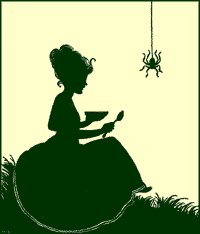
The surname recorded as Moffatt, Muffett, and Moffett, originates from the town of
Moffat in Annandale, in the former county of Dumfriesshire, Scotland. The
derivation is from the Gaelic 'magh', meaning a field or plain, and 'fada',
translating as 'long', - the long field.
A number of the early surname holders seem to have had a close relationship with
the church. These recordings include Walter de Moffat, the bishop of Glasgow in
1268, and another Walter de Moffat, who was Archdeacon of Lothian in 1348.
Despite the church influence, the 'Moffatt'
clan as a whole were more usually known
for their prominent membership of the 'Border Reivers'. This 'Gathering of the Clans' raided the north of England for over three centuries. Even as late as the Elizabethan period, their raiding parties took them as far south as York. In 1587, it was recorded (in Scotland) that the 'Moffettis of the West Marche' were among the 'unruly border clans', whose activities were 'to be curbed'. Their most notable enemy was the powerful Johnstone clan. In 1557 the Johnstones murdered clan chief Robert Moffat and burned the building in which a number of Moffats had gathered, slaughtering those who tried to escape. From that date the Moffats were a leaderless clan.
The name is first recorded in London church registers in 1569 when Joane Muffett was married at the church of St Thomas the Apostle. The first recorded spelling of the family name is shown to be that of Nicholas de Mufet, which was dated circa 1230, a charter witness in the city of Glasgow, during the reign of King Alexander 11 of Scotland, 1214 - 1249. Surnames became necessary when governments introduced personal taxation. In England this was known as Poll Tax. Throughout the centuries, surnames in every country have continued to "develop" often leading to astonishing variants of the original spelling
Including: . Maffit Meffat Meffet Moffat Moffatt Moffet Moffett Moffit Moffitt Moffot & Muffet
Little Miss Muffet sat on a tuffet, Eating her curds and whey; Along came a spider, who sat down beside her And frightened Miss Muffet away.
Miss Muffet was a 16th century little girl whose name was Patience. Her father, Dr. Thomas Muffet an entomologist who died in 1604 Dr. Thomas Muffet, was a medical doctor. He believed that eating mashed spiders was a cure for the common cold. It was said that Miss Muffet ate her share of mashed spiders.
A Brief History of the Muffett's
Motto: Spero Meliora
From the Latin - I aspire to greater things or I hope for better things.



Please click on the name you wish to look at in fuller details
